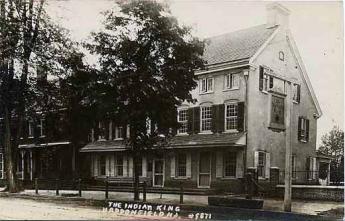Related Topics
Haddonfield (all 26)(1 of1)volume 38
 Haddonfield is a bit of a secret. It's Philadelphia's "Main Line, East"
Haddonfield is a bit of a secret. It's Philadelphia's "Main Line, East"
Norcross
It's a strange observation that many important Democratic politicians are members of family dynasties. Almost everyone knows of the Kennedy family of Boston, but there are many many more. One of them is the Norcross family of Camden County, New Jersey. You can devise your own theory why this is so, the most common being the Irish background of large families; but I have a different theory. It is that the 16th Century began the tradition that a "perpetuity" was only allowed to exist for "one lifetime plus 21 years", and this definition worked its way into English Common Law. That was not particularly hampering to the Rockefellers and Vanderbilts in the days before confiscatory taxes, but it was mightily favorable to those with tribal dominance, such as the Irish, who always had an extra son or two to pass along family secrets. The Irish spoke English, so they were the dominant immigrants in a flood of 19th Century newcomers. So this was the source of many priests and policemen, firemen -- and politicians intertwined. No one troubled to devise blockades against passing political tricks and strategies through the inheritance process, and indeed it may not be possible. But the Ford Family established its family dominance of car dealerships by unwritten promises, which were strictly enforced; so the idea may not even have had an Irish origin.
Camden was a city created by the Delaware River separating New York City from Philadelphia. The river was a terminus for the Camden and Perth Amboy RR, and the entire RR was contained within New Jersey. In those days, each new corporation had to have a law created for it, and this one granted the Camden and Amboy RR a perpetual right to be the sole railway in the state. Subsequently, the Camden and Amboy led to ferries across the River, which in turn connected to railroads from Philadelphia to the South. Here was the sense in which Camden/Philadelphia became the "most Southern of the Northern cities". Another way of looking at it was to became a little Chicago thriving on hotels and shopping between trains for Atlantic Coast travelers. Three main industries had their headquarters plus feeder suppliers there (New York Ship Building, RCA-Victor Phonograph, and Campbell Soup). When the Ben Franklin Bridge was built in 1926, the fundamental reason for Camden's existence disappeared. It took eighty years, but one by one the industries shuttered and went away, leaving transportation lines and empty buildings. At some time along the way, the Norcross family realized that location next to a big city would become valuable in time, and the family and allies bought it with money derived from the family insurance company for municipalities. It's now starting to sell off the location bit by bit, understanding it might take another century to realize the full value of the location. Even a century after the bridge-building, hardly any private building has taken place, and slums still occupy vast tracts of otherwise abandoned land. It has the highest murder rates in the nation and must subsist on political dealings for decades to come. Real estate developers can't normally live long enough to reap the full rewards, but a politically savvy family can wait it out to becoming billionaires. They would have to sustain many family quarrels, divorces, and egregious mistakes for this scenario not to play out.
How did the monopoly of the Camden and Amboy disappear? Well, I couldn't prove this in court, but in political circles, it is calmly believed that a man named Stanhope slipped a document breaking the monopoly in amongst a pile of papers for the Governor to sign obliviously. It was the same caper that sent William Penn (the richest private landholder in the world) to debtor's prison, a century or so earlier. The Norcross family surely had nothing to do with this story. Real estate is just a tough game. Anyway, the breaking of the monopoly was too far advanced to retreat. Bucks County had to be pacified in some way, so the 1858 City/County consolidation was arranged as a political reform, with the City of Philadelphia as the largest stockholder of the emerging Pennsylvania RR on the west side of the River. In 2000, Robert Montgomery of Ardrossan said he had no idea where his stock certificates came from, and even the mighty Pennsylvania Railroad has disappeared.
Originally published: Monday, May 20, 2019; most-recently modified: Tuesday, May 21, 2019